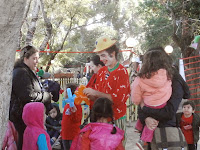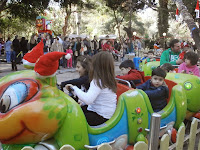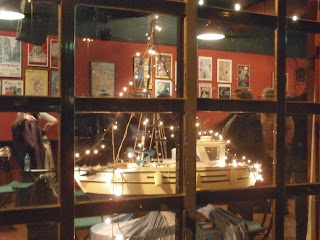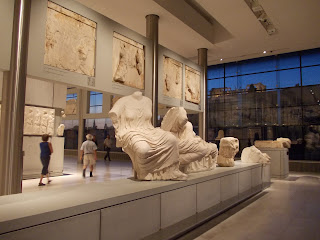

 Leading up to Christmas in Greece, a mild season
this year in Crete and Athens, poinsettia trees and cyclamen flowers bloom, community
groups organize charity bazaars, schoolchildren stage performances during which
parents talk, and schools offer parties featuring cheese pies and sweets, Santa
and stories, crafts and (in our case) Cretan dances and Zumba. Christmas
carnivals spring up in various city squares, parks, and stadiums, with colorful
rides, giant bubbles, and seasonal activities for children, as well as
opportunities for commerce by immigrants, Roma, and Greeks. Greeks gather at
the homes of friends and family for reunions, reminiscences, gifts for the kids,
food, and drink--and to share their pessimism about the future of Greece, complaining
about high taxes and expenses, with salaries back at 2006 levels for those who
still have jobs, and ever lower pensions. I have spoken with only one person
who believes the current centrist coalition government is doing the right
thing, and only one other person who believes the leftist SYRIZA (the main
opposition party) can improve things. And those are the leading political
parties in Greece, nearly tied in the polls--but with not even a quarter of
respondents supporting either one.
Leading up to Christmas in Greece, a mild season
this year in Crete and Athens, poinsettia trees and cyclamen flowers bloom, community
groups organize charity bazaars, schoolchildren stage performances during which
parents talk, and schools offer parties featuring cheese pies and sweets, Santa
and stories, crafts and (in our case) Cretan dances and Zumba. Christmas
carnivals spring up in various city squares, parks, and stadiums, with colorful
rides, giant bubbles, and seasonal activities for children, as well as
opportunities for commerce by immigrants, Roma, and Greeks. Greeks gather at
the homes of friends and family for reunions, reminiscences, gifts for the kids,
food, and drink--and to share their pessimism about the future of Greece, complaining
about high taxes and expenses, with salaries back at 2006 levels for those who
still have jobs, and ever lower pensions. I have spoken with only one person
who believes the current centrist coalition government is doing the right
thing, and only one other person who believes the leftist SYRIZA (the main
opposition party) can improve things. And those are the leading political
parties in Greece, nearly tied in the polls--but with not even a quarter of
respondents supporting either one.
Piraeus, or Pireas (the port city that runs into Athens), is
really not where I wanted to spend this most home- and family-centered holiday
(in my own American experience), partly because it's not a place where I can
satisfy my very particular sentimental and aesthetic preferences for small
colorful lights on large houseplants and live Christmas trees, plus the dozens
of red and white candles my mother used to light all over our spacious living
room, the menorah candles for Hanukkah, a fire in the fireplace (and no concern
for smog), hot chocolate and Monopoly after ice skating and sledding or frisbee
football, my mother's cooking and baking and our Christmas cookie decorating
sessions: my all-American, intercultural, nostalgic memories, not even
completely marred by my parents' divorce, with extended family so far-flung
across our large continent that we adopted dear friends as family to share
holidays with us. Of course, this first Christmas and New Year’s after my
mother died were bound to be difficult. I miss her, as well as my father, and I
haven’t yet gotten used to her absence.
 But here we are with my mother in law (one of the
most thoughtful, accommodating, unselfish people I know) in Piraeus for the
typically long school vacation: more than two weeks this year, to encompass
everything from Christmas Eve through New Year's and then the celebration of
the lights (Epiphany) and Agios Ioannis (Saint John's) day. And it was busy
enough here with the shopping, children's gifts, kitchen cleanup, visiting with
Greek family, and cooking (including my annual turkey soup with leftovers from
the bird Greeks eat only at Christmas and New Year's, along with goat and pork)
that I kept my nostalgic desires in check and just accepted the day for what it
was, here and now, festive and celebratory in its own family- and food-centered
Greek way.
But here we are with my mother in law (one of the
most thoughtful, accommodating, unselfish people I know) in Piraeus for the
typically long school vacation: more than two weeks this year, to encompass
everything from Christmas Eve through New Year's and then the celebration of
the lights (Epiphany) and Agios Ioannis (Saint John's) day. And it was busy
enough here with the shopping, children's gifts, kitchen cleanup, visiting with
Greek family, and cooking (including my annual turkey soup with leftovers from
the bird Greeks eat only at Christmas and New Year's, along with goat and pork)
that I kept my nostalgic desires in check and just accepted the day for what it
was, here and now, festive and celebratory in its own family- and food-centered
Greek way.
While the White Mountains of Crete have been living
up to their name, well covered with snow for weeks now, here in Piraeus on my
Christmas morning walk it felt like fall, with mild temperatures and many trees
still full of more yellow leaves than we tend to see in our part of Crete, with
some crumbling underfoot as they used to back in Pennsylvania, except that here
they mix with citrus trees in front of the few dilapidated and renovated
neoclassical houses that remain, dwarfed between five to seven-story apartment
blocks. A few boats decorated with lights add an interesting twist to the
ubiquitous Christmas trees and scattering of Santas (and the large boat in
Athens's central Syntagma Square provides an especially noteworthy return to
Greek tradition this year after last year's bizarre, needlessly expensive
scaffolding-light-and-noise monstrosity).
Once our company joined us, I witnessed an
interesting Christmas dinner discussion of the accuracy of goat bone readers
(like fortune tellers, or the readers of eggs and interpreters of coffee
grounds left in a cup). A father claimed that the first initial of his
then-future wife's name, the birth of their two sons, and the sons' first
initials had all been correctly foretold by a Romanian woman, but his wife
disagreed, and his son objected that such beliefs were un-Christian. A
grandmother explained that the Orthodox Church allows such fortune telling on
Saint George's day in April, and her son whispered to me that this was part of
the church's attempts to reconcile the pagan and Christian beliefs of Greeks in
early Christian times. I suppose I could have heard a similar conversation (which
reminds me of Zora Neale Hurston) in some parts of the U. S., but I haven't
been in the right place for it so far.
 Young people in Greece sing their Christmas carols,
or Calenda, in return for money, often accompanying themselves with triangles,
on Christmas Eve morning and again on New Year's Eve morning and January 5,
the day before Epiphany, which is known here as Fota, the festival of light and
day for blessing the waters and boats (when a priest throws a cross into the
freezing sea, and brave youths race to retrieve it). Sometimes we see wandering
bands or accordionists playing carols or other music in the streets these days.
What I'd never seen before was a little band of youths with two trombones, a
clarinet, a trumpet, and a drum
Young people in Greece sing their Christmas carols,
or Calenda, in return for money, often accompanying themselves with triangles,
on Christmas Eve morning and again on New Year's Eve morning and January 5,
the day before Epiphany, which is known here as Fota, the festival of light and
day for blessing the waters and boats (when a priest throws a cross into the
freezing sea, and brave youths race to retrieve it). Sometimes we see wandering
bands or accordionists playing carols or other music in the streets these days.
What I'd never seen before was a little band of youths with two trombones, a
clarinet, a trumpet, and a drum  marching through a small neighborhood
"super"market as they played (and how they could do that, with the
crowds in that small space, I don't know; I find it difficult to just make my
way through some of the aisles to shop there when it's busy!). I hadn't ever
seen (or heard) the Calenda played with plastic tubes of varying lengths,
either, as groups of visitors did at the Eugenides Foundation's Interactive
Science and Technology Exhibition Hall next to its digital planetarium last
week. I played my part best in the carol with the same tune as "Jingle
Bells," where I actually knew the rhythm. Then we watched a wonderful film
about expeditions to Everest, which was the highlight of our visit, since some
of the exhibits didn't work correctly, although others were fascinating. Our
favorite was the air percussion room, where it sounded like we were playing
drums, cymbals, and bells when we hit the air.
marching through a small neighborhood
"super"market as they played (and how they could do that, with the
crowds in that small space, I don't know; I find it difficult to just make my
way through some of the aisles to shop there when it's busy!). I hadn't ever
seen (or heard) the Calenda played with plastic tubes of varying lengths,
either, as groups of visitors did at the Eugenides Foundation's Interactive
Science and Technology Exhibition Hall next to its digital planetarium last
week. I played my part best in the carol with the same tune as "Jingle
Bells," where I actually knew the rhythm. Then we watched a wonderful film
about expeditions to Everest, which was the highlight of our visit, since some
of the exhibits didn't work correctly, although others were fascinating. Our
favorite was the air percussion room, where it sounded like we were playing
drums, cymbals, and bells when we hit the air.
 Actually, there was a great deal more energy, as
well as far more people, when the Technical University of Crete hosted a science
fair for elementary school students on December 7, with chemistry
demonstrations using ordinary household materials such as baking soda, vinegar,
eggs, water, oil, and dyes; small robotic dogs and soccer players that ran
(awkwardly) and attempted goals (without any remote control); cell phones to
tell when plants must be watered; illustrations and elementary discussions of
mathematical models and fractals; computer-generated shadow puppetry;
elementary students' exhibits of the water cycle and a volcano that erupted;
and more demonstrations than anyone could visit in a few hours. What was most
encouraging was that both children and parents were excited and impressed by
the science, and with an estimated 3,000 visitors, it felt like the university
was THE place to be on that Saturday afternoon! My son even delayed leaving for
a birthday party in order to watch more of the chemistry demonstrations. I
suppose that event was more impressive than the Athens museum both due to the
enthusiastic, energetic efforts of hundreds of students and professors, and
because Chania residents unaccustomed to access to a science museum really
appreciated seeing something extraordinary.
Actually, there was a great deal more energy, as
well as far more people, when the Technical University of Crete hosted a science
fair for elementary school students on December 7, with chemistry
demonstrations using ordinary household materials such as baking soda, vinegar,
eggs, water, oil, and dyes; small robotic dogs and soccer players that ran
(awkwardly) and attempted goals (without any remote control); cell phones to
tell when plants must be watered; illustrations and elementary discussions of
mathematical models and fractals; computer-generated shadow puppetry;
elementary students' exhibits of the water cycle and a volcano that erupted;
and more demonstrations than anyone could visit in a few hours. What was most
encouraging was that both children and parents were excited and impressed by
the science, and with an estimated 3,000 visitors, it felt like the university
was THE place to be on that Saturday afternoon! My son even delayed leaving for
a birthday party in order to watch more of the chemistry demonstrations. I
suppose that event was more impressive than the Athens museum both due to the
enthusiastic, energetic efforts of hundreds of students and professors, and
because Chania residents unaccustomed to access to a science museum really
appreciated seeing something extraordinary.More recently, we delayed our venture into central Athens to see what Christmas carnivals and activities might impress our children and to check out this year's lovely traditional decorations in Syntagma Square, because of concern about the severe smog created by the fireplaces and wood stoves used to heat homes. This is the result of heating oil prices that are drastically higher than a few years ago (and much higher than in New York and London), thanks to the government’s efforts to combat smuggling and to raise more of the money that the Troika demands, while salaries are so much lower than they used to be, and many families’ electricity has been cut off because they couldn’t pay their bills. There has been such a serious problem with air quality in Athens and some other Greek cities that children and elderly people were advised to stay indoors some days, and people were asked to stop using fireplaces. Since one teenager died and another couple's house burned down during recent attempts to heat homes with fires, more assistance has been offered to the most impoverished so they can afford to heat their homes more safely, but I don't know if the aid will reach enough people in time to prevent more tragedies. And southern Greece isn’t even very cold yet. We are fortunate; we are still able to pay our bills, even though D’s salary and benefits have been cut several times. I was not even bothered by the air quality in the city; nor did I notice a smell of smoke outside. Even so, each time I came in after going out at night, I was surprised to find that my hair smelled like a wood fire.

 The government and its supporters claim that the
economy is improving--but so they've been saying for some time, and many
ordinary Greeks have yet to see evidence of this. Granted, Greece will have a
primary surplus this year, and investors in government bonds will make a great
deal of money, but this occurs at the expense of people who lack heat,
electricity, homes, sufficient warm clothing and shoes, necessary health care, and/or
adequate nutritious food, since the government and the Troika have acted less
to promote ordinary people's well-being than to help banks, bonds, and the
national economic numbers that are most important to the upper classes. It's
true that some Greeks have enough money to rent little cars for small children
or pedal-powered cars for families next to the extensive Paleo Faliro playgrounds
and promenade by the sea, while others can afford the entry fees required for
children's holiday activities that were free last year, when the city of Athens
spent far more on Christmas, or pay for carnival rides. New exercise equipment
for adults in Paleo Faliro, a new daycare center and toddlers' playground in
Neo Faliro, and still
The government and its supporters claim that the
economy is improving--but so they've been saying for some time, and many
ordinary Greeks have yet to see evidence of this. Granted, Greece will have a
primary surplus this year, and investors in government bonds will make a great
deal of money, but this occurs at the expense of people who lack heat,
electricity, homes, sufficient warm clothing and shoes, necessary health care, and/or
adequate nutritious food, since the government and the Troika have acted less
to promote ordinary people's well-being than to help banks, bonds, and the
national economic numbers that are most important to the upper classes. It's
true that some Greeks have enough money to rent little cars for small children
or pedal-powered cars for families next to the extensive Paleo Faliro playgrounds
and promenade by the sea, while others can afford the entry fees required for
children's holiday activities that were free last year, when the city of Athens
spent far more on Christmas, or pay for carnival rides. New exercise equipment
for adults in Paleo Faliro, a new daycare center and toddlers' playground in
Neo Faliro, and still
However, many small businesses are struggling to
stay open, or closing, leaving many empty spaces for rent or destroyed by
weather and vandalism. Tens of thousands of university students began their
fall semester only in mid December due to staff strikes, and prisons suffer
from such excessively overcrowded,
unhygienic, barbaric conditions that they sound like they resemble the dungeons
of the Dark Ages (Greek prison system collapsing – labeled 'inhuman'). Doctors
serving Greek public servants, including teachers and professors,
have been
striking for months, except for emergency treatment, leaving basic and preventive
care unprovided for many who cannot afford to pay private doctors. The article about the "Council of Europe report: 10austerity imposed human rights abuses in Greece" provides a
concise overview of the ways hastily applied, inadequately considered austerity
measures threaten the health and well-being of Greeks and other Europeans with their negative effects on pensions, health care, workers' rights,
 unemployment
rates, and freedom of expression, rather than “Safeguarding human rights
in times of economic crises”
(as the report is titled). The article suggests that Greek
leaders' plans to satisfy the Troika's demands to save money often end up
conflicting with the Treaty on European Union and the European Social Charter. On subways and sidewalks,
wandering Roma children with accordions and collection cups compete with Greek
beggars' stories of hardship, prompting some handouts, some silence, and one
well-dressed middle-aged woman’s notation of an unemployed father's address, with
the comment that she wanted to send him something.
unemployment
rates, and freedom of expression, rather than “Safeguarding human rights
in times of economic crises”
(as the report is titled). The article suggests that Greek
leaders' plans to satisfy the Troika's demands to save money often end up
conflicting with the Treaty on European Union and the European Social Charter. On subways and sidewalks,
wandering Roma children with accordions and collection cups compete with Greek
beggars' stories of hardship, prompting some handouts, some silence, and one
well-dressed middle-aged woman’s notation of an unemployed father's address, with
the comment that she wanted to send him something.
 On the other hand, some free-spirited Greek youths
demonstrated their exuberance with back flips and twists into the Paleo Faliro
sand the other day. And the impressive wall painting of two blue hands cupped
below a flaming euro coin (pictured in my October 22, 2012 blog) outside the
Theatro kato ap' tin Gefira (Theater Under the Bridge) near the Olympiakos
soccer stadium in Neo Faliro has been replaced by a possibly more hopeful image
of a lit candle. I don't know if that refers to the Christmas holiday, or to
increased hope for the Greek economy and the country as a whole. In any case,
we shall see whether the midnight firecrackers and phone calls of New Year’s
Eve, the Vasilopita or New Year’s cake, with one piece set aside for strangers,
and the family gatherings over holiday dinners foreshadow a more joyful,
caring, generous and hopeful year for Greece in 2014. We finally visited the nearby
Archaeological Museum of Piraeus for the first time yesterday and were impressed
with its small but often impressive collection before beginning a long seaside walk
past the boats and harbors of Piraeus, so that was a good start for us. May it be
a happier new year for those who struggled in 2013.
On the other hand, some free-spirited Greek youths
demonstrated their exuberance with back flips and twists into the Paleo Faliro
sand the other day. And the impressive wall painting of two blue hands cupped
below a flaming euro coin (pictured in my October 22, 2012 blog) outside the
Theatro kato ap' tin Gefira (Theater Under the Bridge) near the Olympiakos
soccer stadium in Neo Faliro has been replaced by a possibly more hopeful image
of a lit candle. I don't know if that refers to the Christmas holiday, or to
increased hope for the Greek economy and the country as a whole. In any case,
we shall see whether the midnight firecrackers and phone calls of New Year’s
Eve, the Vasilopita or New Year’s cake, with one piece set aside for strangers,
and the family gatherings over holiday dinners foreshadow a more joyful,
caring, generous and hopeful year for Greece in 2014. We finally visited the nearby
Archaeological Museum of Piraeus for the first time yesterday and were impressed
with its small but often impressive collection before beginning a long seaside walk
past the boats and harbors of Piraeus, so that was a good start for us. May it be
a happier new year for those who struggled in 2013.



















